基于Python的高校请假管理信息系统开发(Django框架)(任务书,开题报告,外文翻译,论文11000字,参考代码)
摘要
伴随着信息技术的发展与成熟,使用计算机进行人员的科学高效管理模式代替效率低下的人工管理模式已经发展为当下时代的潮流,同时也是当下社会发展的需求。当下,许多高校仍然没有开发出相应的请假管理系统,大量的人力、物力以及时间花费在学生的请假管理上,因此,开发出请假管理信息系统是时代发展和高校管理的需求。同时,响应了政府的加快信息化建设的号召。基于Python的高校请假系统能够有效的减少人力、物力,提升老师的办公效率,减轻对学生管理的负担。
学生请假管理是对请假学生以及想请假的学生进行管理。一方面,学生有请假需求时,可以同过申请界面,完成对请假的申请;另一方面,学生请假结束时,可以在线进行销假,方便学校、学院的考勤管理。本系统可以分为请假申请、申请状态查询、销假、辅导员请假申请管理,请假人员统计查询,任课老师课堂管理等模块,方便了师生请假,优化了请假和销假流程,改善了课堂考勤管理。
本系统的开发应用了多种前沿框架,数据库使用了MYSQL。后端的开发语言为Python,使用了Django框架,此框架有利于开发者搭建Web网站,提升开发者效率,减少时间,有利于项目的开发管理。前端开发语言为HTML、JavaScript,使用了Bootstrap、DataTables框架,这些框架有利于开发者能够快速的优化页面、美化页面,友好的显示数据。
关键词:请假管理;Django框架;课堂管理;Bootstrap框架
Abstract
With the development and maturity of information technology, the scientific and efficient management mode of using computers to replace the inefficient manual management mode has developed into the current trend of the times, but also the demand of current social development. At present, many colleges and universities still haven't developed the corresponding leave management system. A lot of manpower, material resources and time are spent on the leave management of students. Therefore, the development of leave management information system is the demand of the times and University management. At the same time, it responds to the call of the government to speed up the construction of information technology. The university leave system based on Python can effectively save manpower and material resources, improve teachers'office efficiency and reduce the burden of student management.
The management of students'leave is to manage the students who take leave and those who want to take leave. On the one hand, when students need leave, they can use the application interface to complete the application for leave. On the other hand, when students leave, they can sell their leave online to facilitate the attendance management of schools and colleges. The system can be divided into leave application, application status inquiry, leave sales, counselor leave application management, leave personnel statistical inquiry, classroom management of teachers and students, which facilitates the leave of teachers and students, optimizes the process of leave and leave sales, and improves classroom attendance management.
There are many frontier frameworks in the development of this system, and MySQL is used in the database. The back-end development language is Python, which uses Django framework. This framework helps developers build Web sites, improve developers'efficiency, save time, and facilitate project development and management. The front-end development language is HTML and JavaScript. Bootstrap and DataTables frameworks are used. These frameworks are helpful for developers to quickly optimize pages, beautify pages and display data friendly.
Key Words:Leaving-manage,Django frameworks, Bootstrap frameworks
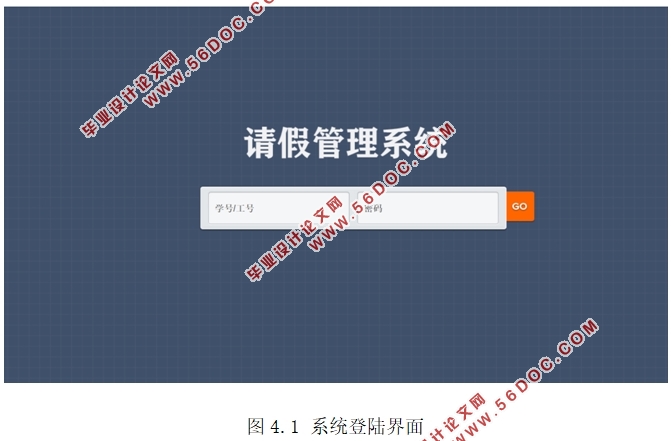
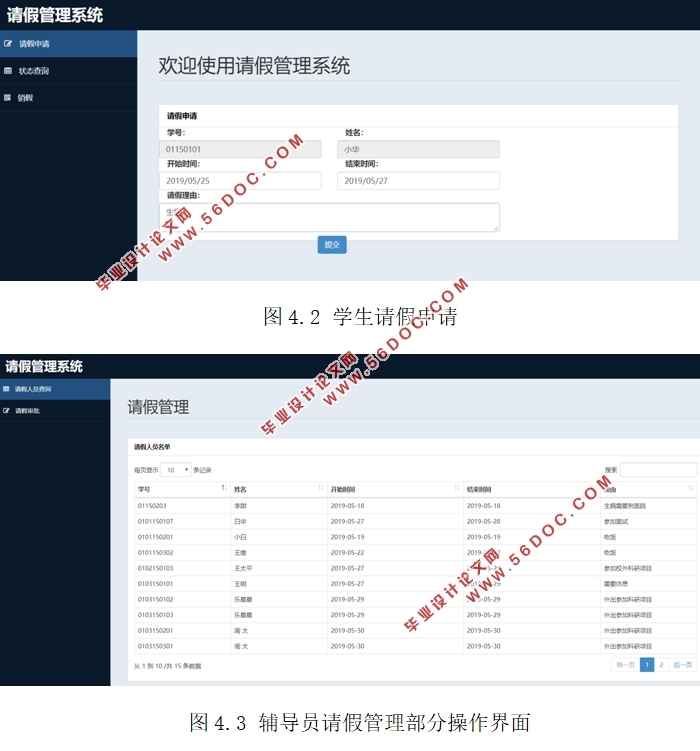
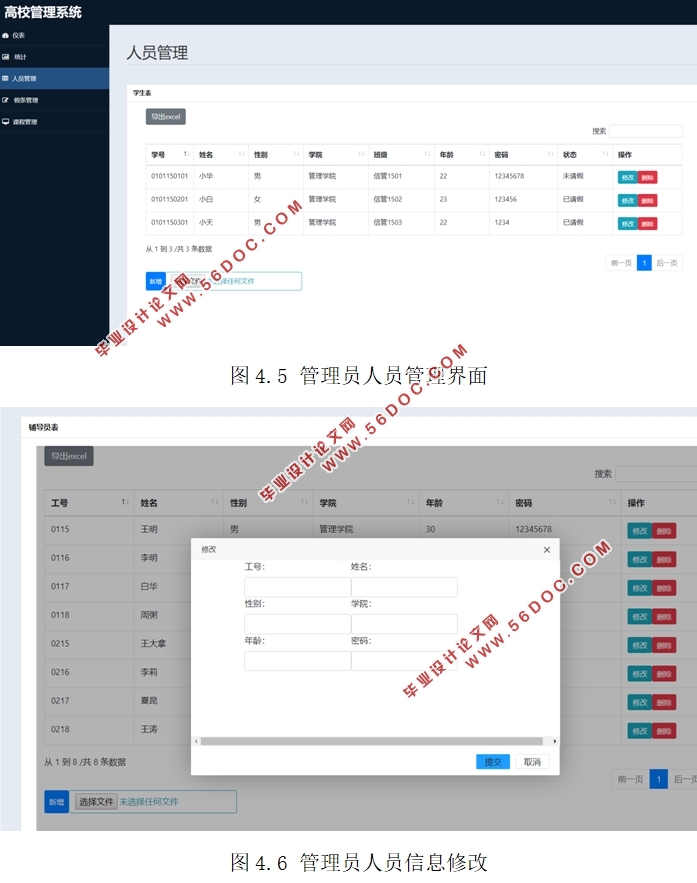
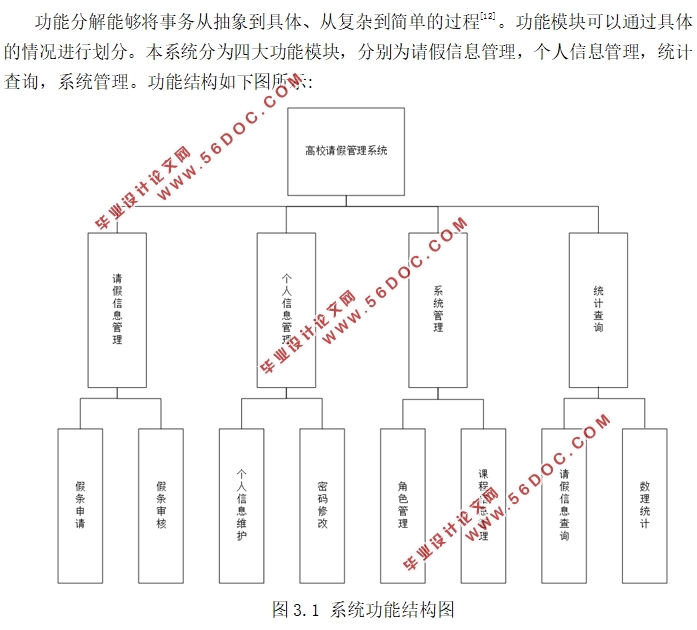
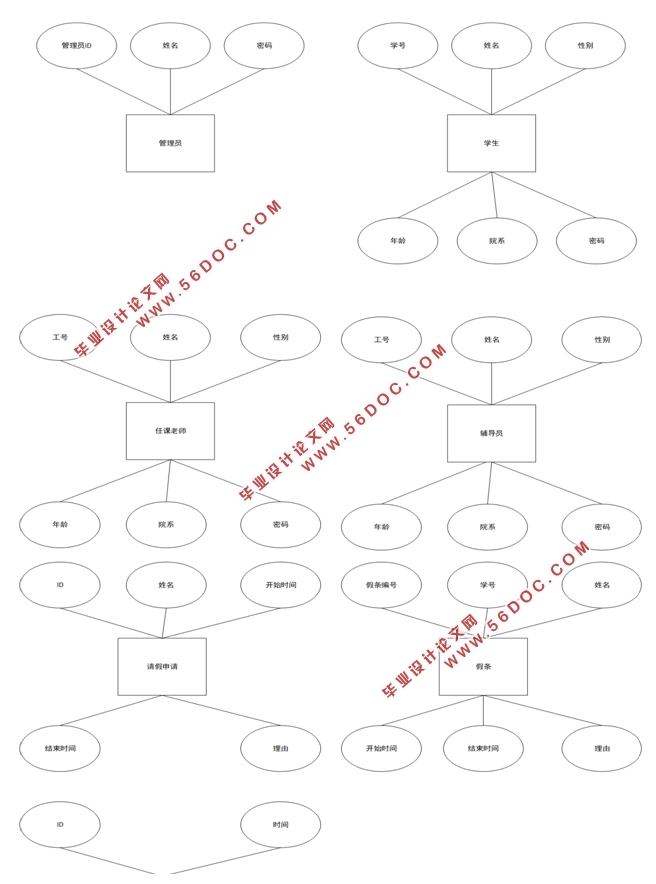
目录
摘 要 I
ABSTRACT II
第1章 绪论 1
1.1 设计的目的 1
1.2 设计的意义 1
1.3 国内外研究现状 2
1.3.1 国内研究现状 2
1.3.2 国外研究现状 2
1.4 设计内容与设计方法 3
1.4.1 系统目标及基本内容 3
1.4.2 技术方法及措施 3
第2章 系统分析 5
2.1 需求分析 5
2.2 可行性分析 5
2.2.1 技术可行性 6
2.2.2 经济可行性 6
2.2.3 组织可行性 6
2.3 组织结构分析 6
2.4 业务流程分析 7
2.5 数据流程分析 10
2.6 数据字典 12
2.6.1 外部实体 12
2.6.2 数据流条目 13
2.6.3 数据项描述 14
2.6.4 数据流清单 15
第3章 系统设计 16
3.1 系统总体设计 16
3.1.1 功能模块设计 16
3.1.2 物理配置方案设计 17
3.2 系统详细设计 18
3.2.1 编码设计 18
3.2.2 数据库设计 19
3.2.3 输入输出设计 26
3.2.4 界面设计 28
第4章 系统实施 31
4.1 系统模拟运行 31
4.2 系统测试 35
4.2.1 系统测试计划的制定 35
4.2.2 系统测试用例 35
4.2.3 系统测试计划的执行 36
第5章 总结与展望 38
5.1 总结 38
5.2 展望 38
参考文献 39
致 谢 41
|











